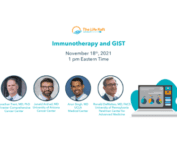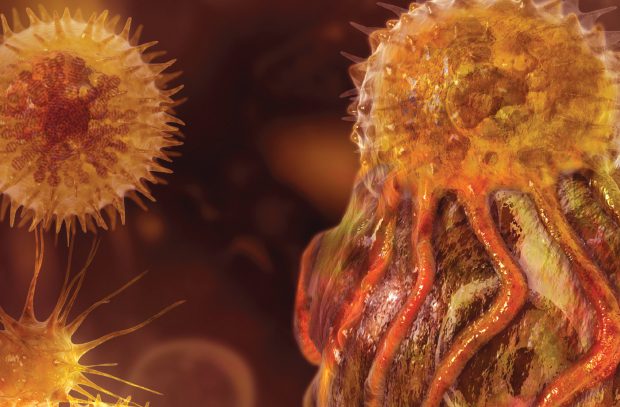Surgery and targeted drug therapies provide the mainstay of GIST treatments. Various other treatments may be used from time to time in some cases.
These include:
Radio Frequency Ablation (RFA) – A minimally invasive procedure used to heat and destroy small liver tumors. RFA uses a needle electrode which is inserted through the abdomen wall into tumors in the liver. It is used in selected cases that meet certain criteria. In GIST, it is probably most commonly used to treat localized progression (usually one or two tumors) in the liver. There is a limit to the size and volume of tumors that can be treated with RFA.
- Read more about RFA at RadiologyInfo.org.
- Click here to read about radioembolization in Patients with Progressive Gastrointestinal Stromal Tumor Liver Metastases Undergoing Treatment with Tyrosine Kinase Inhibitors.
Hepatic Arterial Chemoembolization (HACE) – A procedure that uses a catheter to deliver chemotherapy directly to an artery(s) supplying liver tumors. In addition to the chemotherapy, an embolic agent (a device or agent to block the blood vessel) is placed inside the blood vessel, trapping the chemotherapy in the tumor. This increases both the dose of chemotherapy that can be delivered to the tumor and decreases the amount of chemotherapy that is delivered to the rest of the body. This is often called chemoembolization. In some cases, the chemotherapy is eliminated and only the embolic agent is used to block the blood supply. This is called “bland embolization”. With the advent of targeted therapies, hepatic arterial embolization is not used as often as in the past; however it remains a treatment approach that is sometimes used. Although not compared directly, progression-free survival times appear to be similar to targeted therapies for imatinib-resistant GIST.
- Read more about chemoembolization at RadiologyInfo.org.
Immunotherapy + Targeted Therapy – Is being explored as a treatment option in clinical trials.
- Immunotherapy trial strives to improve Gleevec response
- MSKCC opens new immunotherapy trial for GIST
- Immunotherapy: a new hope for GIST treatment
- Gleevec: revolutionizing GIST cancer treatment
Read more about immunotherapy:
Immunotherapy and GIST
This webinar provided an overview of immunotherapy with some examples of studies exploring single agent versus combination of therapy in GIST.
A Conversation with Breelyn Wilky, M.D.
Dr. Breelyn Wilky answering questions on a panel of GIST experts at Life Fest Miami, 2018. Colorado, Clinical Trials & Immunotherapy Dr. Wilky, Director of Sarcoma Translational Research at the University of [...]
This is Not the End – A Survivor’s Story
A story about a cancer survivor recently appeared in the Washington Post: “This is not the end; Using immunotherapy and a genetic glitch to give cancer patients hope”. The story is about a young [...]
Latest Issue of the GIST Cancer Journal Released
The Life Raft Group is pleased to announce the release of the tenth issue of The GIST Cancer Journal, the official journal of the Life Raft Group. The journal is intended to serve as [...]
GIST Cancer Journal Winter 2015 Issue
The Life Raft Group is pleased to announce the release of the eighth issue of The GIST Cancer Journal, the official journal of the Life Raft Group and the first academic journal devoted solely [...]
Gut Microbes and Their Role in Immunotherapy
Immunotherapy is a promising area in cancer research and in emerging treatments. Several new studies highlight the role that gut microbes may play in the efficacy of immunotherapy treatments.In a recent article in the Atlantic, [...]






